This isn’t about what MLMs are or how to identify them. That article can be found here. Rather, it’s about the abhorrent depths MLM distributors will sink to in a desperate attempt to climb out of the financial hole they dug for themselves, and what that says about H. sapiens.
First off, let’s look at the demographics of who joins MLMs. The title perhaps should’ve been “the dark heart of women” but that would come across wrong, probably would get me in trouble with the admins and wouldn’t sound as poetic. It’s nevertheless true that women greatly, greatly outnumber men in MLMs.
Why is this the case? There are a lot of guesses, but no firm conclusions. For what it’s worth, there’s also conspicuous demographic overlap between MLM distributors and Christians, especially Mormons, with Utah being the MLM capitol of the US.
This overlap is non-coincidental in my opinion, as Abrahamic religions have many structural parallels with MLMs. Testimonies from those it supposedly worked for, a strong focus on recruitment, high in-group trust, coaching members with apologetics to use against skeptics, etc. but the parallel I’m concerned with here is their intentional cultivation of suspended hope.
Suspended hope happens when someone fully takes for granted an unfalsifiable future reward, and lives out their lives under the never-ending assumption that it will arrive soon. That is to say a tantalizing promise that is impossible to verify by design, being that it’s in the future, and that our hypothetical believer has gone so far as to organize their life around the assumption that it’s real.
They may have made many sacrifices, even alienated former friends or family members, for the sake of the hypothetical reward. And because of the sunk cost effect, because of how irreversible their investment in the promise has become, they react with reflexive hostility to even the suggestion that it was all for nothing.

Anastase Maragos, via Unsplash
In the case of Abrahamic religions, the unfalsifiable future reward has been “just around the corner” for nearly 2,000 years. Floating in a state of hypothetical ambiguity all that time, with an eschaton cleverly designed to appear constantly imminent. This keeps followers in a tense, ever-eager state of suspended hope. Not just for a few years, but multi-generationally.
MLMs are also designed to keep followers in a state of suspended hope. Distributors are always just a few years away from retiring as a millionaire. They’ve been coached to pick out the color of their Ferrari in advance, so certain are they of their inevitable success. When these rewards do not materialize, rather than being blamed on a lack of faith, it’s because “you didn’t hustle hard enough.”
The reasons why, past the first few layers of down-line under the CEO, it’s mathematically impossible to “hustle hard enough” won’t be covered here as that’s well worn ground with any number of scam warning articles or YouTube videos you can find to explain it. Sufficed to say MLM distributors get strung along to a truly cruel extent. But it’s difficult to feel sorry for them sometimes.



Facebook
What could make someone cynically use the death of their own mother to sell product? Or to recommend “redox molecules”, essential oils, wraps or whatever else to the mother of a terminally ill toddler? These are human beings with human feelings, ostensibly. Statistically, the odds are against them all being sociopaths, though undoubtedly it would help. So what gives?
These are the same relentlessly positive, upbeat women you see retweeting important social causes. Doing their part for the environment. Urging strangers to go vegan. Clearly they have a moral compass and are conscientious individuals, or at least care about appearing that way.
Yet, if you dangle the convincing possibility of untold wealth in front of them like a carrot in front of a pig, tantalizingly just out of reach, their mask slips. Many studies have shown how extreme wealth reduces empathy and helps to rationalize manipulative, exploitative behaviors. Should it surprise us that the illusion of imminent wealth can do the same?



Facebook
The difference is that, should one actually succeed at breaking into the 1% with a series of lucky investments or successful business, they’re largely insulated from the consequences of all the rotten, shady things they had to do in order to get there.
Whereas someone who alienates their friends and family, betraying loved ones by luring them onto the same sinking ship in the hopes of bailing themselves out…doesn’t get a lifeboat.
They’re left socially and professionally isolated, having burned all of the bridges available to them trying to make something work that was unworkable from the start. Often taking out ruinous loans, borrowing from relatives, and scolding skeptics as jealous naysayers who will soon be proven wrong.

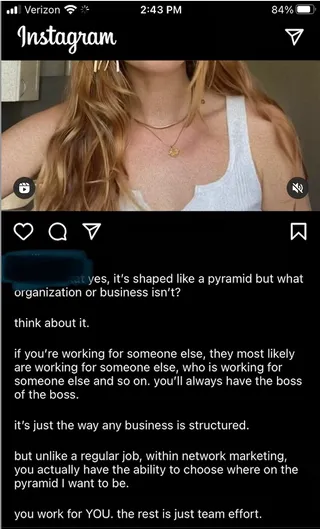

Facebook
By that time, they’re just about out of options. The company put them into a position where they assume all the risk and basically have to make it work somehow or they’re fucked, and sold that to them as a feature, not a drawback. Mark Twain once said it’s easier to fool a man than to convince him that he’s been fooled.
Doubly so in this case because by the point they realize they were tricked, they’ve mouthed off to dozens of well meaning friends who tried to talk them out of it, posturing as if they discovered a golden opportunity only for shrewd, empowered entrepreneurial individuals, insisting that everybody warning them about it simply doesn’t understand business.
Faced with the prospect of public humiliation, many simply double down, then triple down. Sticking their heads in the sand and lying to others about how they’re doing financially. Typically this requires an actual job to work as a majority of distributors don’t break even.

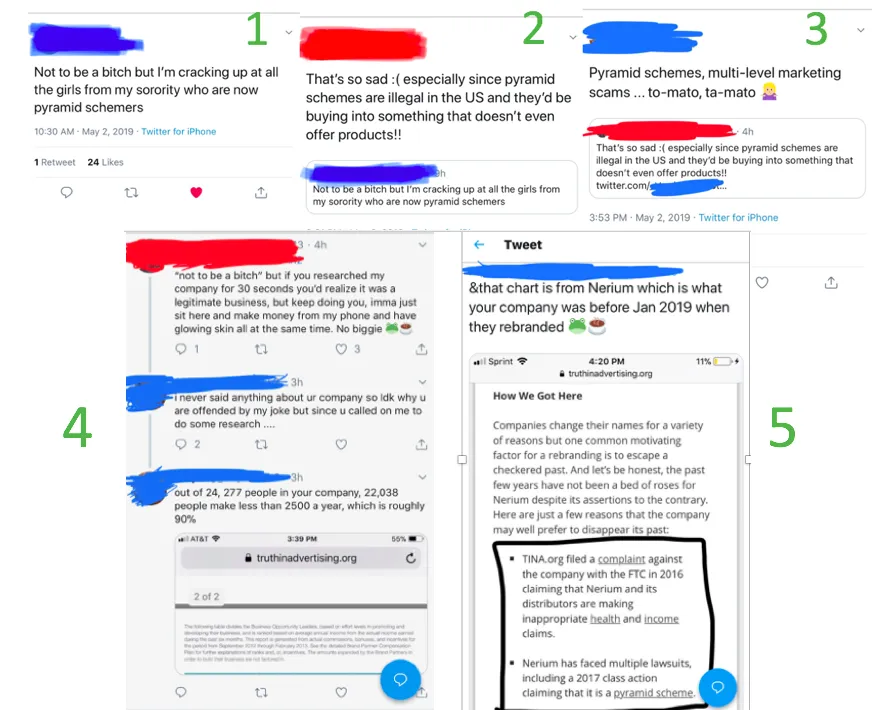
Facebook
By this point they’ve accepted they’re not going to be fabulously wealthy or even make back the money they put into the MLM, they just don’t want to give skeptics the satisfaction of being right. Doubtless this is also a common motivation for people who have spent their lives in a religious movement of some sort, besides the social/professional costs of apostasy.
It’s easy to feel smug, reading these posts. But we’ve all been fooled at some point. If you were roped into something like this, then early on when you still believed in the prospect of a near term jackpot, what wouldn’t you do for it? When the reward is so great and seems so tangible, so imminent. When the alternative is too terrible to contemplate. What wouldn’t you do?
For that matter, what wouldn’t you do to guarantee entry into an eternal paradise? What lengths would you not go to, in order to avoid an equally everlasting torture pit? This may make some sense of how someone could hijack a plane and fly it into a skyscraper, believing 72 virgins were waiting on the other side of death to tirelessly gobble his junk.
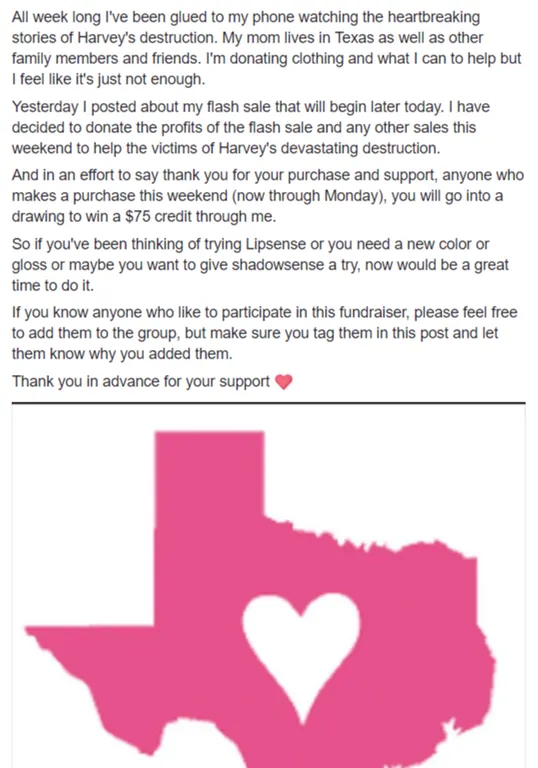


What about after a year of little to no results? Two years? Three? House full of unsellable product, no friends left, family not returning calls because you spammed them for months with pleas to join your downline or pity-buy your products, what would you do?
Leverage tragic natural disasters to sell lipstick? Try to convince people that essential oils cure COVID? Use your own medical misfortune to drive pity purchases? This isn’t even the worst of it, just what I remembered to save. I’ve seen kindergarten teachers shilling MLM product to her classroom, sending pamphlets home with the kids.
I’ve seen Uber drivers use their passengers as a captive audience, I’ve seen destitute single moms urged to spend their last hundred bucks to buy a starter kit (there’s always a buy in), I’ve seen programs for recruiting kids as young as 11 as distributors. Part of a marginalized group? Why not use that to sell Herbalife? Why not try to get at our stimulus checks, while you’re at it?



Facebook
This phenomenon isn’t unique to MLMs. You don’t have to google very long to find cases of rubes who embezzled, stole from family members or went deep into debt in order to raise the “advance fee” in someone else’s advance fee scam, better known as the 419 email scam.
Dangle a big enough carrot in front of anybody, make it look deliciously real, and entice them into making as many sacrifices as possible to get at it. That’s the stick. You can get a mule to pull your wagon for an astonishingly long time with the carrot and stick method, before it either dies of exhaustion or refuses to continue.
I will say in defense of MLMs that they’re a superb test of character. They have a way of coaxing the ugliest part of people out of its hiding spot, deep in their core. It is no wonder then, that faced with the consequence of owning that ugliness, having formerly prided themselves on being compassionate, many instead blame the skeptics. As if reality is decided by consensus, and our naysaying has somehow manifested their failure.
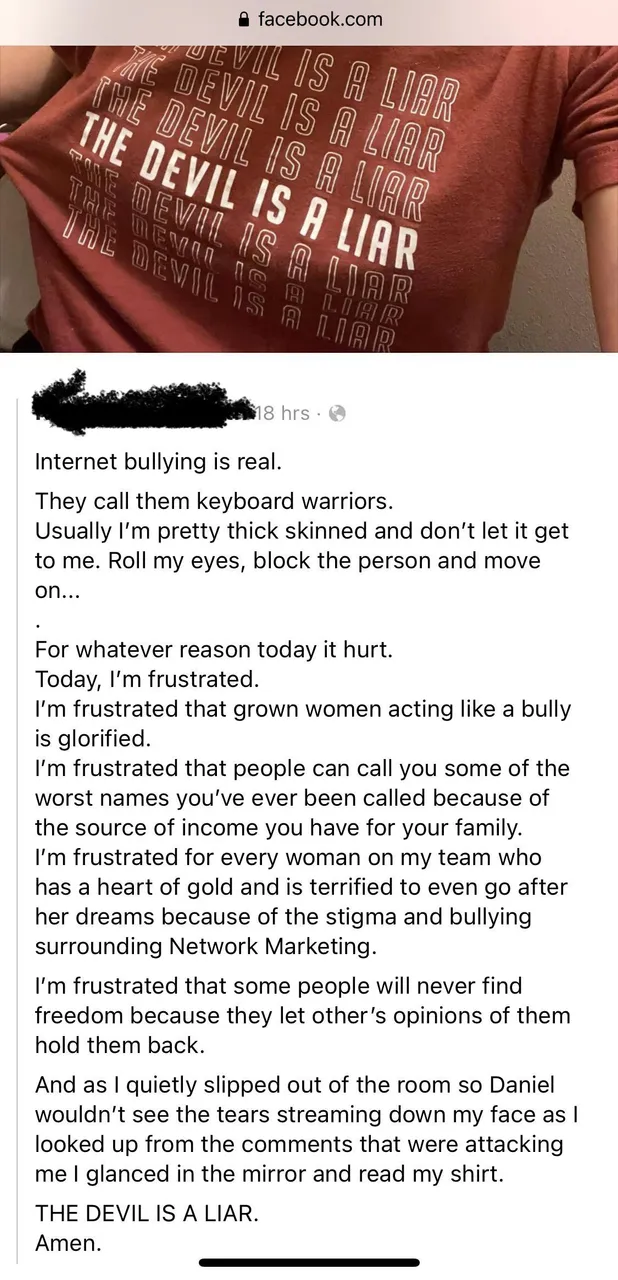
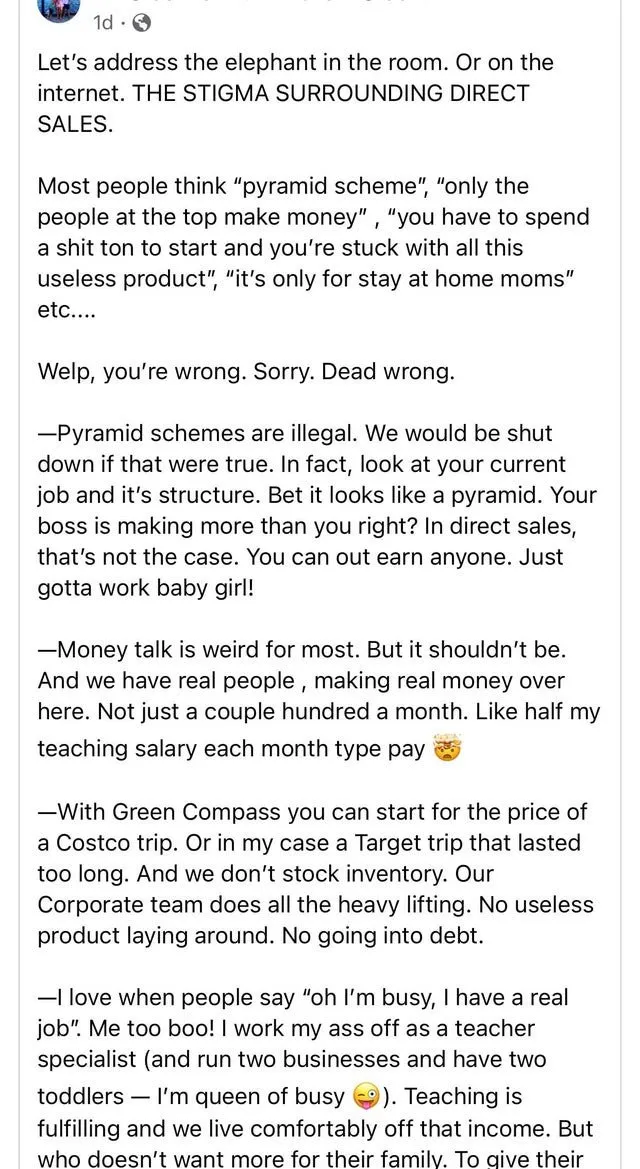
Facebook
Kill the messenger, an ever-popular coping strategy. If the system isn’t working, it can’t be the system’s fault. The system is perfect. The problem must be anyone pushing back against it. Polluting your mind with doubts, and your social media timeline with negative vibes.
No worries, despite the internet at one time holding limitless potential to connect people, it has in recent years facilitated the opposite goal. It’s easier than ever to seal yourself inside an echo chamber only for people in the same boat as you. Where you’ll only hear affirmations, never any toxic doubts.
This is how people stay trapped in MLMs for years, sometimes decades. Some go to their graves still believing they were only a few years from untold riches. A few jump from one MLM to the next, believing that just because most of them are fraudulent doesn’t mean all of them are, not recognizing the MLM business model itself is fundamentally designed to swindle.
Before we heap judgement on these gullible rubes, consider the possibility that the reason you’ve never behaved this way isn’t because you’re morally superior, but because you’re harder to deceive. If you look within yourself, can you say for certain which depths you would, or wouldn’t sink to, if a scam existed that was sophisticated enough to fool you?


